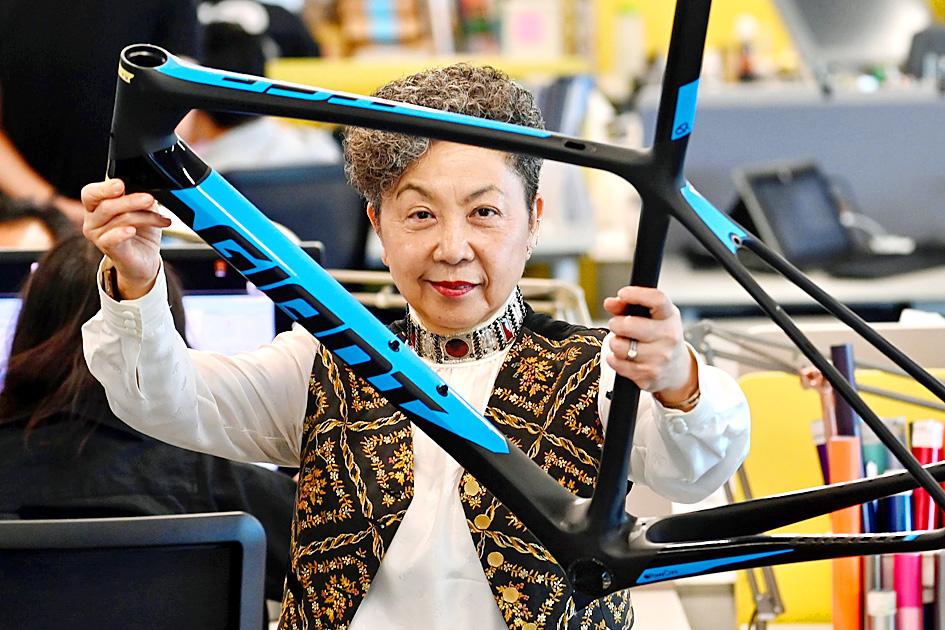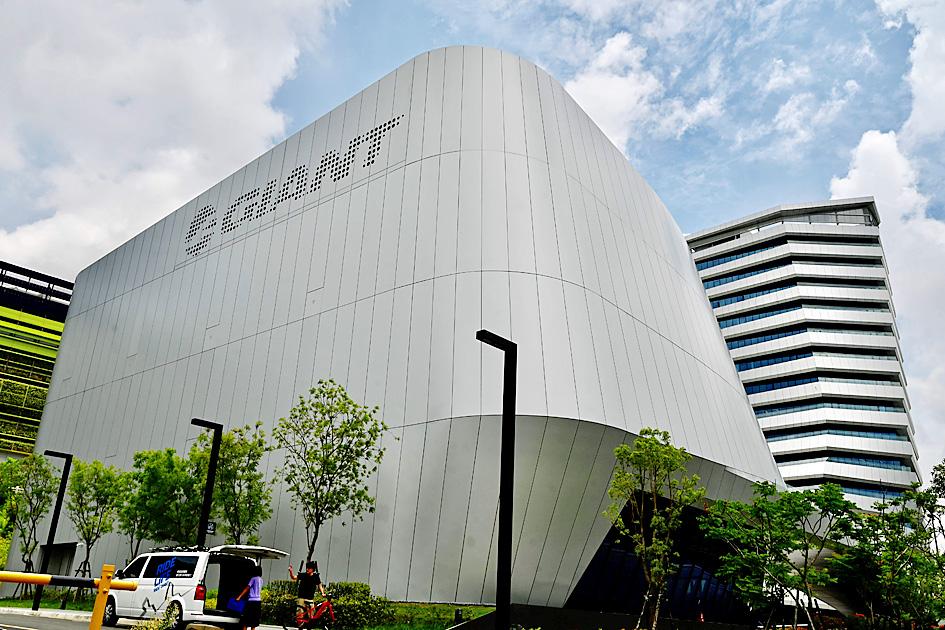Deserted streets, cabin fever and worries over COVID-19 in Europe and North America have sent demand for bicycles into high gear — with factories in Taiwan racing to push out new units and scrambling to find parts.
The pandemic has sparked a global recession and hammered many industries, but it is boom time in the bike world and a major bonus for Taiwan, which is a leading bicycle producer and avoided mass lockdowns by defeating the novel coronavirus early on.
At Giant Manufacturing Co (巨大機械), the world’s largest bike company, it has been a dizzying few months, CEO Bonnie Tu (杜綉珍) said.

Photo: Sam Yeh, AFP
“We saw what happened and then we reacted quickly,” Tu said in an interview last week at Giant’s new headquarters in Taichung.
“We mobilize our companies, including our factories and sales company ... in order to meet the consumer demand,” she said.
The orders have kept coming, with reports of empty bike racks at dealers and long waits for resupply across Europe and North America.

Photo: Sam Yeh, AFP
In Britain, the Association of Cycle Traders said about 20,000 bikes awaiting manufacturing and delivery had already been sold or reserved.
“We’ve seen a mixture of everybody to be honest,” Brixton Cycles director Lincoln Romain said in London last month.
“People that commute all the time, we’ve seen new cyclists, we’ve seen people that have to get in so they have bikes that have been in the shed a little while,” he said.
Across the Atlantic, demand has also rocketed. Year-on-year sales of commuter and fitness bikes increased 66 percent in March, leisure bikes leaped 121 percent and electric bikes rose 85 percent, market research firm NPD Group said.
Tu said demand in the US and Europe has centered on the more affordable “US$1,000 and under” category of bikes.
While Giant’s factories in Taiwan kept rolling, many of its facilities in China had to temporarily shut down when the virus first spread from the central city of Wuhan.
A return to full capacity has been slowed by struggles to get parts from suppliers as they refill factory floors and restock inventories.
“We have to wait for them,” Tu said. “So it is actually quite difficult, but we manage.”
For Europe, Giant will soon benefit from a large factory it has built in Hungary, part of a gradual shift many Taiwanese manufacturers are making to diversify away from China and be closer to consumer markets.
Taiwan Bicycle Association (台灣自行車輸出業同業公會) secretary-general Gina Chang (張蕙娟) said manufacturers initially suffered in the first quarter from canceled or postponed orders when the virus first spread, but since then, demand has roared back.
“We are seeing rush orders or even panic buying,” she said. “Taiwan’s top two bike makers have orders lined up till the end of this year.”
The coronavirus boom is the latest chapter in a renaissance for Taiwan’s bike industry. The nation had for years been the world’s No. 1 bike producer until the 1990s, when China’s economic reforms saw firms — including many Taiwanese manufacturers — take advantage of a vast, cheap labor force.
However, while Chinese factories continue to play a dominant role in terms of sheer numbers, Taiwan production is bouncing back, especially when it comes to higher-quality models and in the rapidly growing electric bike market.
Last year, Taiwan exported US$1.36 billion of non-electric bicycles, down from US$1.5 billion the year before.
However, electric bike production is soaring. Last year, electric bike exports totaled US$863 million, up from US$377 million in 2018, with most heading to Europe.
Exports of electric bikes from January to April this year reached a record US$301 million, up 23.6 percent from the same period last year. And the bikes made in Taiwanese factories tend to be higher quality models that fetch a higher price.
Tu said she hoped the pandemic would help encourage people to adopt bikes as a form of transport long after the threat of the virus has receded, something many European governments are keen on.
“While riding bicycles, you can have fresh air... You cannot be too close otherwise you will crash,” she laughed. “So it is natural social distancing.”

Taiwan’s foreign exchange reserves hit a record high at the end of last month, surpassing the US$600 billion mark for the first time, the central bank said yesterday. Last month, the country’s foreign exchange reserves rose US$5.51 billion from a month earlier to reach US$602.94 billion due to an increase in returns from the central bank’s portfolio management, the movement of other foreign currencies in the portfolio against the US dollar and the bank’s efforts to smooth the volatility of the New Taiwan dollar. Department of Foreign Exchange Director-General Eugene Tsai (蔡炯民)said a rate cut cycle launched by the US Federal Reserve

Handset camera lens maker Largan Precision Co (大立光) on Sunday reported a 6.71 percent year-on-year decline in revenue for the third quarter, despite revenue last month hitting the highest level in 11 months. Third-quarter revenue was NT$17.68 billion (US$581.2 million), compared with NT$18.95 billion a year earlier, the company said in a statement. The figure was in line with Yuanta Securities Investment Consulting Co’s (元大投顧) forecast of NT$17.9 billion, but missed the market consensus estimate of NT$18.97 billion. The third-quarter revenue was a 51.44 percent increase from NT$11.67 billion in the second quarter, as the quarter is usually the peak

Nvidia Corp’s major server production partner Hon Hai Precision Industry Co (鴻海精密) reported 10.99 percent year-on-year growth in quarterly sales, signaling healthy demand for artificial intelligence (AI) infrastructure. Revenue totaled NT$2.06 trillion (US$67.72 billion) in the last quarter, in line with analysts’ projections, a company statement said. On a quarterly basis, revenue was up 14.47 percent. Hon Hai’s businesses cover four primary product segments: cloud and networking, smart consumer electronics, computing, and components and other products. Last quarter, “cloud and networking products delivered strong growth, components and other products demonstrated significant growth, while smart consumer electronics and computing products slightly declined,” compared with the

The US government on Wednesday sanctioned more than two dozen companies in China, Turkey and the United Arab Emirates, including offshoots of a US chip firm, accusing the businesses of providing illicit support to Iran’s military or proxies. The US Department of Commerce included two subsidiaries of US-based chip distributor Arrow Electronics Inc (艾睿電子) on its so-called entity list published on the federal register for facilitating purchases by Iran’s proxies of US tech. Arrow spokesman John Hourigan said that the subsidiaries have been operating in full compliance with US export control regulations and his company is discussing with the US Bureau of